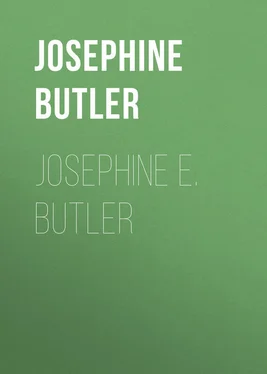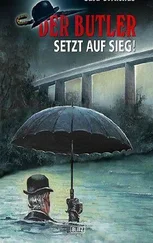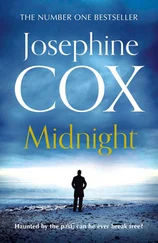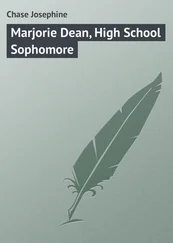Josephine Butler - Josephine E. Butler
Здесь есть возможность читать онлайн «Josephine Butler - Josephine E. Butler» — ознакомительный отрывок электронной книги совершенно бесплатно, а после прочтения отрывка купить полную версию. В некоторых случаях можно слушать аудио, скачать через торрент в формате fb2 и присутствует краткое содержание. Жанр: foreign_antique, foreign_prose, на английском языке. Описание произведения, (предисловие) а так же отзывы посетителей доступны на портале библиотеки ЛибКат.
- Название:Josephine E. Butler
- Автор:
- Жанр:
- Год:неизвестен
- ISBN:нет данных
- Рейтинг книги:5 / 5. Голосов: 1
-
Избранное:Добавить в избранное
- Отзывы:
-
Ваша оценка:
- 100
- 1
- 2
- 3
- 4
- 5
Josephine E. Butler: краткое содержание, описание и аннотация
Предлагаем к чтению аннотацию, описание, краткое содержание или предисловие (зависит от того, что написал сам автор книги «Josephine E. Butler»). Если вы не нашли необходимую информацию о книге — напишите в комментариях, мы постараемся отыскать её.
Josephine E. Butler — читать онлайн ознакомительный отрывок
Ниже представлен текст книги, разбитый по страницам. Система сохранения места последней прочитанной страницы, позволяет с удобством читать онлайн бесплатно книгу «Josephine E. Butler», без необходимости каждый раз заново искать на чём Вы остановились. Поставьте закладку, и сможете в любой момент перейти на страницу, на которой закончили чтение.
Интервал:
Закладка:
“You know that I don’t like parsons; but that is not to the point. If I should ever take orders, I don’t mean to be a mere parson; for if I were like some of them whom I know I should cease to be a man . I shall never wear straight waistcoats, long coats and stiff collars! I think all dressing up and official manner are an affectation; while great strictness in outward observances interferes with the devotion of the heart; and though it may indicate a pious spirit – and therefore deserves our respect – it shows, as I think, a misconception of the relation in which we stand to God, and of the duties we owe to man. It seems to me, after all, that being a good clergyman is much the same thing as being a good man. I have a longing to be of use, and I know of no line in which I can be more useful than the educational, my whole life having been turned more or less in this direction. It is a blessed office that of a teacher. With all its troubles and heart-wearyings and disappointments, yet it is full of delight to those who enter upon it with their whole heart and soul, and in reliance upon our great Teacher. I know of no occupation which more carries its present reward with it.”
Our marriage took place on the 8th of January, 1852, at Dilston. Shortly afterwards we settled at Oxford, which became our home for five years. In reviewing the work done by George Butler in the course of his educational career, one cannot but be struck by the fact that he was somewhat in advance of his time. There are men theoretically in advance of their times, who do good service by their advocacy of progressive principles in writing or in speech. With him it was more a matter of simple practice. He perceived that some study useful or necessary for the future generations, and in itself worthy, had scarcely an acknowledged place in the curriculum of the schools and universities, or that some new ground necessary to be explored was still left untrodden; and without saying much about it, without any thought of being himself a pioneer in any direction, he modestly set himself to the task of acting out his thoughts on the subject. His absolute freedom from personal vanity withheld him from proclaiming that he was about to enter on any new line, and at the same time enabled him to bear with perfect calm, if not with indifference, the criticisms, witty remarks and sometimes serious opposition which are seldom wanting when a man or woman ventures quietly to encroach upon the established order of things in any department of life. At Oxford he was the first who brought into prominence the study of geography. His geographical lectures there were quite an innovation, creating some amusement and a good deal of wonder as to how he would succeed. It was a subject which had hitherto been relegated in an elementary form to schools for boys and girls, and was unrecognised, except by a very few persons, as the grand and comprehensive scientific study which it is now acknowledged to be.
At Oxford the subject was entirely new, at least to the older members of the university, who, however, to their credit, came to the lectures, and listened with teachable minds to truths novel to them concerning the world they were living in. We drew large illustrative maps for the walls of the lecture room. I recall a day when I was drawing in a rough form an enlarged map of Europe, including the northern coast of Africa and a part of Asia Minor. It happened that several fellows and tutors of colleges called at that moment. I continued my work while they chatted with him on the curiosity of his introduction in Oxford of so elementary a study. The conversation then turned on letters we had just received from Arthur Stanley and Theodore Walrond, who were visiting Egypt. “Where is Cairo?” someone asked, turning to the map spread on the table. I put the question to an accomplished college tutor. His eye wandered hopelessly over the chart. He could not even place his hand on Egypt! I was fain to pretend that I needed to study my performance more closely, and bent down my head in order to conceal the irreverent laughter which overcame me.
George Butler was one of the first, also, who introduced and encouraged the study of Art in Oxford in a practical sense. In the winter of 1852-53 he obtained the permission of the Vice-Chancellor and Curators to give a course of lectures on Art in the Taylor building. These lectures were afterwards published by J. W. Parker, under the title of Principles of Imitative Art . While promoting the study of Art in Oxford, working with pupils, and examining in the schools, he undertook to write a series of Art criticisms for the Morning Chronicle and afterwards for another paper, visiting for this purpose the galleries and yearly exhibitions in London. This he did for a year or two.
“It was amusing,” he wrote to his mother, after his first visit in this capacity to the Society of British Artists, “to see the ‘gentlemen of the press’ (of whom I was one!) walking about dotting down observations. I travelled up to town with Scott, the architect, who has engaged me to attend a meeting of his workmen, and give them an address on ‘Decorative Art and the Dignity of Labour.’ Josephine and I are both engaged in copying some drawings by Turner in the Taylor Gallery.”
Indefatigable in his efforts to master any subject which attracted him, he was also equally ready and anxious to impart to others any knowledge he had thus gained. He found time among his other occupations to make a very thorough study of some ancient Oscan inscriptions, with engravings of their principal monuments, which he found in the Bodleian Library. He became much interested in that portion of history – almost lost in the mists of the past – which is illustrated by the marvellous records and monuments of Oscan, Umbrian, and Etruscan life in the great museum at Bologna. He worked at and completed, during one of the long vacations, a series of enlarged copies in sepia of the small engravings and prints of these monuments in the Bodleian. These enlargements were suitable for wall illustrations, for a set of lectures which he afterwards gave on the “Ancient Races of Italy.” It was very pleasant to us when we visited Florence together, some years later, to see the originals of some of the Cyclopean ruins of which we had together made large drawings, those gigantic stones of all that remains of the ancient Etruscan walls of Fiesole, up to the lovely heights of which we drove one clear, bright winter’s day.
I have many other memories of our life at Oxford – some very sweet, others grave. I recall with special pleasure our summer evening rides. During the first two years we spent there my father kindly provided me with a horse, a fine, well-bred chestnut. My husband and I explored together all the rising grounds round Oxford. Behind our own little garden there were tall trees where nightingales sang night and day for a few weeks in spring. But it was in the Bagley Woods and in Abingdon Park that those academic birds put forth all their powers. We sometimes rode from five in the afternoon till the sun set and the dew fell, on grassy paths between thick undergrowths of woods such as nightingales love to haunt, and from which issued choruses of matchless song.
Our Italian studies were another source of enjoyment. Dante Rossetti was then preparing matter for his book, Dante and His Circle , by carefully translating into English the Vita Nuova and lyrical poems of Dante, together with other sonnets and poems written by some of his predecessors, such as Cavalcante, Orlandi and Angiolieri of Siena. Mr. Rossetti sent to us occasionally for criticism some of his translations of the exquisite sonnets of Dante, the English of which he was anxious to make as perfect as possible. We had visited Rossetti’s studio at Chelsea, where he had shown us his portfolios of original sketches for his great paintings, besides many unfinished drawings and pathetic incidents expressed in artist’s shorthand – slight but beautiful pencil designs. My husband’s critical faculty and classical taste enabled him to return the sonnets submitted to his judgment with occasional useful comments. There was little to find fault with in them, however.
Читать дальшеИнтервал:
Закладка:
Похожие книги на «Josephine E. Butler»
Представляем Вашему вниманию похожие книги на «Josephine E. Butler» списком для выбора. Мы отобрали схожую по названию и смыслу литературу в надежде предоставить читателям больше вариантов отыскать новые, интересные, ещё непрочитанные произведения.
Обсуждение, отзывы о книге «Josephine E. Butler» и просто собственные мнения читателей. Оставьте ваши комментарии, напишите, что Вы думаете о произведении, его смысле или главных героях. Укажите что конкретно понравилось, а что нет, и почему Вы так считаете.












